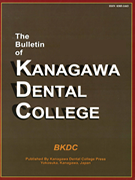- HOME
- > 一般の方
- > バックナンバー:The Bulletin of Kanagawa Dental College
- > 39巻2号
- > アブストラクト
アブストラクト(39巻2号:The Bulletin of Kanagawa Dental College)

English
| Title : | MUC1 Expression in Human Tongue Squamous Cell Carcinoma and Its Relationship to Clinicopathological Features |
|---|---|
| Subtitle : | ORIGINAL ARTICLES |
| Authors : | Yoshinori Jinbu*1, Rie Kawashima*1, Ryuuji Nakayama*1, Norito Miyagi*1, Yasuhisa Shinozaki*1, Hiroto Itoh*1, Tadahide Noguchi*1, Mikio Kusama*1, Keiichi Tsukinoki*2 |
| Authors(kana) : | |
| Organization : | *1Department of Dentistry, Oral and Maxillofacial Surgery, Jichi Medical University, *2Department of Oral Diagnostic Science, Division of Pathology, Kanagawa Dental College |
| Journal : | The Bulletin of Kanagawa Dental College |
| Volume : | 39 |
| Number : | 2 |
| Page : | 65-69 |
| Year/Month : | 2011 / 9 |
| Article : | Original article |
| Publisher : | Kanagawa Odontological Society |
| Abstract : | [Abstract] Mucins are high molecular weight glycoproteins that have oligosaccharides attached to tyrosine, serine or threonine residues of the mucin core protein backbone with oglycosidic linkages. MUC1 has been reported to be associated with the invasive growth of various types of cancers and the poor outcome of patients. The authors performed immunohistochemical staining of MUC1 in human tongue cancers and analyzed its relationship with clinicopathological features. Oral biopsy specimens of 30 cases of tongue cancer that had been diagnosed and treated at Jichi Medical University Hospital were used. Clinical information regarding the subjects was reviewed and statistical analysis was performed using the Chi-square test. Overall, 60% of the cancers were MUC1 positive. The percentage of MUC1-positive cancers in each TNM class was determined. MUC1-positivity was higher in the T3+T4 group (86%) than in the T1+T2 group (52%). The percentage of MUC1-positive specimens in the N+ group (67%) was slightly higher than that in the N0 group (58%). A higher percentage of specimens in the mode of invasion (4C) group showed MUC1 expression (71%) compared with that in the mode of invasion (2+3) group (56%). The percentage of MUC1-positive specimens in the postoperative neck lymph node metastasis group (75%) was higher than that in the non-metastasis group (54%). However, these differences were not statistically significant. Thus, MUC1 was preferentially expressed in advanced and metastatic squamous cell carcinoma of the tongue and appears to be a predictive marker for lymph node metastasis. |
| Practice : | Dentistry |
| Keywords : | MUC1, TNM classification, Mode of invasion, Lymph node metastasis, Tongue cancer, Immunohistochemistry |
